- Home
- Gregory Ashe
Paternity Case Page 5
Paternity Case Read online
Page 5
“Just friends? What’s that supposed to mean, Somers? You’re my partner, not my boyfriend. Remember?”
Somers didn’t say what he was thinking, but it was obvious, even to Emery Hazard.
“My point,” Somers said, still holding up his hands, “is that I came over here to explain why I acted like a dick.”
Hazard shrugged, looking past Somers’s shoulder to scan the far side of the room. The two boys—the ones who had escorted Bing’s daughter out of the room a few minutes earlier—had returned. Bing’s daughter was squeezed up against Glenn Somerset again, but now Hazard’s attention went to the boys. They were in their late teens, juniors or seniors in high school. Hazard hadn’t noticed them before because they had been on the opposite side of the Christmas tree, and the massive, confettied monstrosity had hidden them from view. Both boys had dark hair, and their formalwear was slightly disheveled: collars undone, ties loosened, shirt cuffs hanging open. One of the boys was staring at Glenn Somerset and the teenage girl with a look of undisguised fury. The other boy—and this was where it got interesting—was sitting in his lap and running fingers through his hair.
“What’s that about?” Hazard asked.
“Can I explain this first?”
“Those boys: they’re together, right?”
Somers cast a glance over his shoulder, immediately dismissing the boys and turning back to Hazard. “Look, things got weird between me and Bing at the end, before I went to college. I never really got my footing back, and it threw me off to see him.”
“They’re definitely together. They’re kissing, but the bigger one looks ready to bite out the other boy’s tongue he’s so mad.”
“Are you even goddamn listening to me? I acted like a huge dickplug.”
“Yeah. You did. I don’t care. Something’s not right.”
“Something’s not right.” Somers flapped his arms. “Great, now he finally clues in to the fact that something’s not right. Yeah, I know something’s not right. I screwed up. That’s what I’m trying to say. I . . . I saw Bing, and all of the sudden it was high school all over again, and I just—”
“I already told you,” Hazard said, pushing past Somers, “I don’t care if you reverted to preschool.” Hazard’s attention had already moved past the conversation and towards the scene unfolding across the room. The bigger boy had stood up, dumping the other boy onto the ground, and he was marching towards Glenn. A fight was about to take place—or, perhaps more accurately, a brutal ass-whipping. Glenn still hadn’t noticed, but the girl had. She latched onto Glenn even more tightly, hissing something at the boy who was marching towards them. He shouted something back at her. He looked like he had big plans for breaking every bone in Glenn Somerset that he could reach.
As Hazard stepped forward to intervene, movement to his left distracted him. Santa, naked except for his trademark cap, barreled into the family room. He was holding a gun, a compact revolver, and he swung it in a wide arc. Hazard was already drawing his weapon when Santa fired the first time. A Christmas ornament, strung high overhead, exploded, and shards of glass rained down into the party. The screaming began just as the lights went out.
Screaming. Everyone screaming. The darkness was full of people jostling, fighting their way to the door in a blind, mad panic. Hazard fought against the crowd, but it was like fighting against the tide. He managed to free the .38, but now people pressed against him, and Hazard didn’t dare bring the gun up for fear of hurting someone. He fought back against the crowd, using his size and muscle to force a path diagonal to the current.
A second shot rang out. The muzzle flash painted a starburst and then the blackness rushed in again. Again, the screaming rose in pitch, and a seemingly endless number of people pressed against Hazard, insane with their need to reach the exit. Hands clawed at his face and throat and collar. Stiletto heels stabbed at his feet. Rank sweat and boozy, panicked breaths made it hard for Hazard to pull air into his lungs.
A third shot. And then a fourth.
Hazard broke free from the crowd. He launched himself at the blank space where he had seen the most recent muzzle flash. For a long moment, he had the sensation of falling, robbed of his sense of space by the darkness. Then Hazard hit something—someone. Someone big and flabby and surprisingly solid. Hazard’s size, though, and his momentum were enough to carry both men to the ground.
Blind in the darkness, Hazard struggled to hold onto his own gun while grappling with the man. A fifth shot. A sixth. Was that an arm? Christ, where was his arm? Hazard brought his elbow down hard and heard something crack, and a wheezing scream. Another shot. And then Hazard had hold of an arm, and he followed it up to a wrist. He slammed the wrist and hand against the floor, and something heavy and metallic clattered across the floor.
No more shots. The screaming had grown more distant, and Hazard guessed that most of the people had made their way out of the Somerset home. The man under him struggled, and Hazard dropped another elbow. He was rewarded by another pained explosion of breath.
Then a bluish-white light shone across the floor, and Hazard had his first glimpse of his captive: naked, bloody Santa Claus, his nose broken, his lips split. Hazard flipped Santa onto his belly, found his cuffs, and snapped them around Santa’s wrists.
“It’s all right,” Hazard said, shouting because the noise of the gunfire had blown out his hearing. “His gun went that way.”
Somers, his own face streaked with blood—his nose looked suspiciously swollen—pivoted, sending the weak gleam from his mobile phone spilling across the enormous room.
At the edge of the light, two bodies lay in a twisted pile, their clothing soaked with blood: Glennworth Somerset and the girl.
SOMERS KNELT OVER HIS FATHER, trying to stop the bleeding. Santa Claus had shot Glenn Somerset in the stomach at least once, maybe twice. It was hard to tell because the lights were out and because there was blood. So much blood. Somers barely remembered crossing the room to where his father lay. He remembered glancing at the girl—Bing’s daughter—and knowing she was dead; a bullet had punched through her back, and she wasn’t breathing. He didn’t remember where he got the fabric that he now wadded up and held against his father’s stomach. All his attention now focused on this makeshift attempt to stop the bleeding. In the tips of his fingers, Somers felt a pulse. His own? Or was that his father’s heart pumping blood out of the gaping wound?
Somers could hear it—a soft, squelching noise as blood soaked through the improvised bandage. That was crazy. That was batshit. There was no way that Somers could hear, actually hear, blood pumping out. But he could. He could hear that squelching. His Great-aunt Elaine had a red rubber hot water bottle that she would put in her bed in the winter, and when she would carry the bottle to the sink and empty it, it sounded like this: fingers compressing the rubber until it squeaked against itself. God, this was insane, the whole thing was insane, and if his father—
—died—
—no, that wasn’t even a legitimate thought, that wasn’t something he could allow himself to consider.
It was with something like surprise that Somers realized the lights had come back on. In the warm, yellow light, his fingers were so many colors: crimson, purple, blue, black. Somers forced his gaze up, towards his father’s face. The flesh was puffy, creamy except where the day’s growth of stubble gave everything an aquamarine cast. His eyes were closed, but he was breathing. Pretty strong breaths. Yes. Good breathing. The lungs hadn’t been damaged, thank God. Over the years, Glenn Somerset had put on weight, but he looked very small now laid out on the floor. It was like gravity had stretched him, stretched him like taffy, and Somers thought that liquids had constant volume but no definite shape. Like all that blood, spilling out thinly across Somers’s knuckles. Someone was talking to him, Somers realized, but he didn’t care. His father was oozing out across the floor, all that blood, what a joke, what a goddamn joke.
“—and if you touch him I’ll break your nose.�
�� That part managed to penetrate Somers’s fog, and he realized it was Hazard speaking. He was using that low, deadly voice that made the hair on the back of Somers’s neck stand up, the voice like he’d do everything he said and it wouldn’t bother him a bit.
“We’ve got a job to do,” a snippy young man’s voice answered.
“Open your mouth again,” Hazard said. “Go ahead.”
If the snippy young man had more to say, he didn’t voice it.
A moment later, Hazard’s face swam into Somers’s line of sight. “Somers, the paramedics are here. You’ve got to get out of their way.”
Somers blinked. The words washed over him, past him, away.
“Come on,” Hazard said. His big hands, surprisingly delicate, prized Somers’s fingers off the makeshift bandage, and Hazard helped Somers to his feet.
“No,” Somers said, shaking his head and stretching back towards his father. “I’ve got to—”
“They’re going to take him to the hospital,” Hazard said, steering Somers a safe distance away. “That’s the only chance your father has.”
Somers stared as the paramedics went to work. Their movements were precise, efficient, and controlled. One was the young man that Somers had heard objecting; the other was a much older woman with leathery skin. The young man’s hands trembled, but he kept working. The woman—her hands looked like they could have held an ocean and not spilled a drop. Liquid—
—blood—
—had a constant volume but no definite shape.
Faster than Somers would have believed, they transferred his father to a gurney and wheeled him from the house. Somers glimpsed Sheriff Bingham embracing his son, both of them paralyzed by the death of Bing’s daughter. And Somers noticed his mother trailing after him, her movements stiff, as though she hadn’t walked in years. She glanced around, her blind gaze moving over Somers as though he weren’t even there, before settling on Jeremiah Walker. He crossed the room as though summoned by that gaze, settling an arm around Grace Elaine’s shoulders and urging her after the gurney.
“You need to go,” Hazard said, turning Somers towards the door. “Your mom is going to need you. We’ll take care of everything here.”
Everything here. Two words. Everything here meant bullet casing. It meant blood. It meant the gunpowder smell that had replaced everything else. It meant talking to drunken socialites. It meant facing a murderer. It meant a dead girl. Somers felt as though he were rising from deep waters—slow at first, and then faster and faster as the pressure shot him towards the surface. He saw, now, that Wahredua’s finest were already here. How much time had passed? Somers cast a quick glance. Where was Santa?
“Let’s go,” Hazard said, giving another push. “You can ride in the ambulance. I’ll meet you there as soon as I can.”
Somers shook his head.
“Your mother—”
“Fuck no.” Somers lifted his hands, intending to press on his pounding head, but he saw the blood again. Already it had dried, turning sticky and crusty as it did. “I just—I need a minute—”
“You need to get your ass out of here.” Martha Cravens, Wahredua’s Chief of Police, marched towards them.
Cravens was a big woman with an hourglass shape; large without being fat, her hair stylishly gray, she somehow managed to give off the air of being someone’s grandmother. The reality was very different. Cravens had toughed it out as one of the only women on a small-town police force, and she had earned respect and trust while doing so. She had been talking, Somers noticed, with Mayor Newton, who was one of Cravens’s strongest supporters. The mayor folded his arms and studied Somers from across the room; there was something in the old man’s face that made Somers’s skin crawl.
“That’s what I’ve been telling him,” Hazard said. “Look, I’ll drive you there.”
“No way.” Somers raised his hands again, saw the blood again, stopped again. “No.”
“I know what you’re thinking,” Cravens said. Her face was hard—lined with sympathy, yes, but still hard enough to crack a goddamn Rolex so it wouldn’t ever tick again. “You think you’re going to take matters into your own hands. You think I might be stupid enough to let you within ten miles of this business because it’s personal, because you’re a good detective, because you’ve put in your time.”
“Chief,” Somers said, his voice thick, so thick it barely escaped his throat. “You’re out of your goddamn mind if you think I’m not handling this.”
“What’s there to handle, Detective? Everybody saw the shooter come into the room with a gun. We don’t need to do a goddamn thing except wait. We’ll take statements, pick up the casings, and we’ll run ballistics, just to be sure, but that’s just to keep lawyers from crawling down our throats. There’s no case to work. This thing was shut almost before it opened.” Cravens’s face softened, the lines around her eyes and mouth deepening. “John-Henry, the best thing you can do is help your family right now.”
Somers shook his shoulders, as though trying to throw off an invisible hand.
“Come on,” Hazard said in a quiet voice. When Somers didn’t respond, he said, “John-Henry.”
The sound of that name on Hazard’s lips, a name Hazard hadn’t used since—
—the locker room, Somers’s heart thudding as he saw the desire in Hazard’s eyes—
—high school, made Somers blink. He nodded. Cravens grasped his hand, and Somers let Hazard hustle him out into the night. It was cold, much colder than Somers remembered. His breath misted, but it was so goddamn cold that the mist should have crystallized, fallen to the earth, and shattered. Spindrift glistened in the headlights of a dozen police cruisers. Pebbly snow chittered against the metal shells. Overhead, the stars looked close enough that Somers thought he could reach up and shove them around a little.
The stars. Somers shouldn’t have been able to see the stars. His father had lit up the house like the Bellagio, and the lights had blotted out the sky. But the exterior lights, the decorative lights, had not come back on.
“Keys,” Hazard said, still guiding Somers towards the Interceptor.
Somers fished them out of his pocket and pressed them into Hazard’s hand: the skin warm, callused, strong.
Why hadn’t the exterior lights come back on?
Hazard wasn’t acting like Hazard either. He was shivering, and for the first time, Somers noticed that Hazard wasn’t wearing his jacket. He also noticed that Hazard was holding the door open for him, waiting for Somers to climb into the car.
“Where’s your jacket?”
Shaking with the cold, Hazard jerked his head at the car. “Will you get in?”
“Did you leave it inside?”
“Yeah, sure. Before I freeze my fingers off if you don’t mind.”
Somers climbed into the seat, Hazard shut the door, and a moment later he climbed behind the steering wheel. The SUV roared to life, and warmth fluttered out of the vents.
“That was your jacket. I was using it to—my father’s stomach, the blood—” Somers cut off, unable to finish the statement.
Hazard shrugged.
“Jesus, if I’d just taken him to the station like my father asked.” Somers rocked forward. He lifted his hands to cover his face, but again the sight of blood stopped him. Scrubbing at his shirt, Somers tried to clean the tacky mess from his hands, but all he succeeded in doing was spread a rust-colored stain across the cloth. He scrubbed harder; the friction brought heat to his hands. If the goddamn blood would just come off—
Hazard’s hands closed around his wrists. “Breathe.”
Somers couldn’t breathe. He rocked forward again. “I should have just taken him to the fucking station. But I had to be an ass. I had to make a point. I had to—”
The sound of paper ripping filled the car, and Somers glanced over. Hazard had a packet of alcohol-cleanser towelettes, and he was working one of the cloths free. Without speaking, Hazard gripped Somers’s
hand and began cleaning the dried blood from his fingers. Somers knew he should say something. Stop. That would be the smartest thing. Or, let me. Anything would be better than silence. Even crying, even sobbing would be better than the sick feeling in his stomach and the tightness in his throat.
But Somers didn’t say anything because right then, Hazard’s touch felt like the only thing keeping him from flying apart. Hazard cleaned with strong, firm movements, but again he showed that surprising gentleness as he manipulated Somers’s hands. When he had finished—and, in the process, used all of the towelettes—Hazard grabbed Somers’s chin. This grip was not gentle; it was painful, and it hurt more as Hazard forced Somers’s head so that their eyes met.
“You say one more time that you should have taken him into the station, and you’ll be shitting out your own teeth for the next year.”
Somers started to laugh. He wasn’t sure where the laughter came from—the sick feeling inside was still there, just pushed to the back a little—but the laughter felt real. He laughed until a hint of a smile cracked Hazard’s stern expression and Hazard’s fingers dropped away. Still laughing, Somers leaned back against the glass. Cold soaked through his jacket and shirt, and it felt clean against all that sickness inside him.
“That’s your idea of being comforting?” Somers said as his laughter faded. The tightness in his throat had eased. He still felt like shit, but he felt like shit with his eyes open.
“That’s my idea of keeping you from being an even bigger horse’s ass.”
“Can we—I mean, would you take me to the hospital?” Somers paused. “I can ask one of the uniforms to drive me if you need to get home.”
Hazard growled something under his throat and shifted the Interceptor into gear. Their tires stirred up tiny cyclones of snow as they pulled away from the Somerset home and headed into the city.
“What was that?”
“I said you really are a dipshit.”
“Hazard?”
Hazard didn’t respond.
“Ree?”

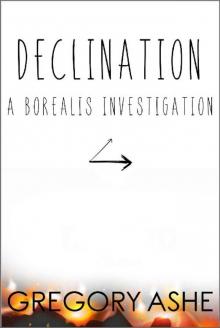 Declination
Declination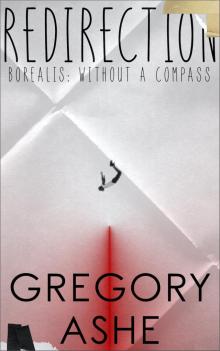 Redirection
Redirection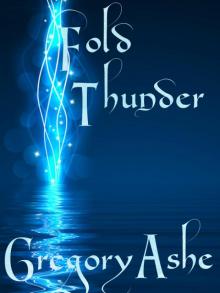 Fold Thunder
Fold Thunder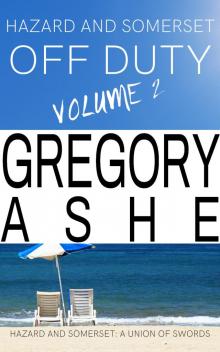 Hazard and Somerset
Hazard and Somerset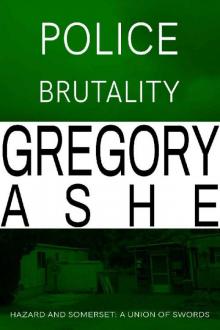 Police Brutality (Hazard and Somerset: A Union of Swords Book 2)
Police Brutality (Hazard and Somerset: A Union of Swords Book 2)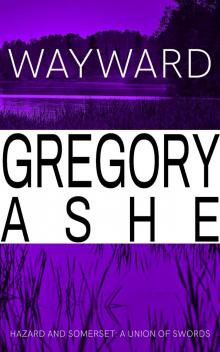 Wayward
Wayward The Same End (The Lamb and the Lion Book 3)
The Same End (The Lamb and the Lion Book 3)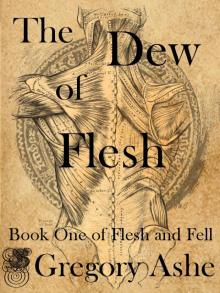 The Dew of Flesh
The Dew of Flesh The Same End
The Same End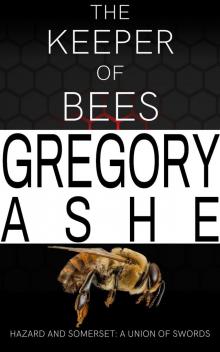 The Keeper of Bees ARC
The Keeper of Bees ARC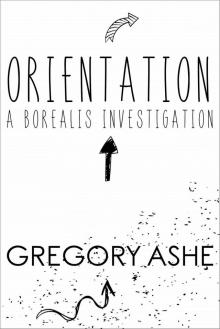 Orientation (Borealis Investigations Book 1)
Orientation (Borealis Investigations Book 1) The Indifferent Children of the Earth
The Indifferent Children of the Earth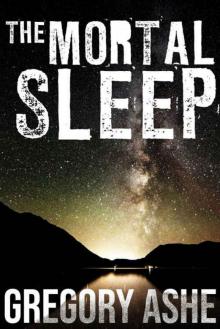 The Mortal Sleep (Hollow Folk Book 4)
The Mortal Sleep (Hollow Folk Book 4)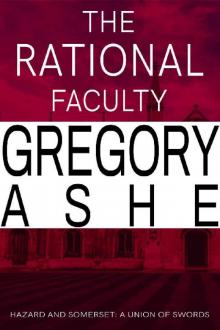 The Rational Faculty (Hazard and Somerset: A Union of Swords Book 1)
The Rational Faculty (Hazard and Somerset: A Union of Swords Book 1) The Weeping Lore (Witte & Co. Investigations Book 1)
The Weeping Lore (Witte & Co. Investigations Book 1)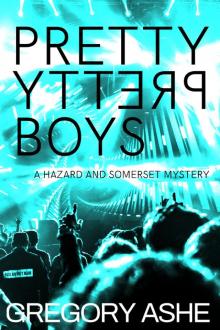 Pretty Pretty Boys
Pretty Pretty Boys Transposition
Transposition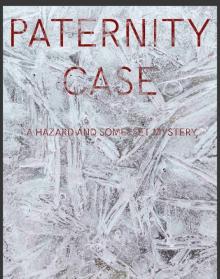 Paternity Case
Paternity Case